In a U.S. multicenter retrospective analysis reported in JACC: CardioOncology, Amin H. Nassar, MD, and colleagues found that immune checkpoint inhibition resulted in mostly moderate activity in patients with primary cardiac soft-tissue sarcomas.

Amin H. Nassar, MD
Study Details
The study included 24 patients with cardiac soft-tissue sarcomas treated with anti–PD-1–based therapy between 2015 and 2022. A total of 17 patients (70.8%) were White, 13 (54.2%) were male, and 8 (33.3%) had angiosarcoma.
Key Findings
At the time of immune checkpoint inhibitor–based treatment, 18 patients (75.0%) had metastatic cardiac soft-tissue sarcomas, and 4 patients (16.7%) had locally advanced disease. Immune checkpoint inhibitors were administered as first-line therapy in 6 patients (25.0%) and as second-line therapy or beyond in 18 patients (75.0%).
Among 18 patients with available response data, objective response occurred in 2 (11.1%, 95% confidence interval [CI] = 3.1%–33%). Among 22 patients with advanced or metastatic disease, median progression-free survival was 5.7 months (95% CI = 2.8–13.3 months), and median overall survival was 14.9 months (95% CI = 5.7–23.7 months). Median progression-free survival (1.7 vs 11 months, P < .0001) and median overall survival (3.0 vs 24.0 months, P = .008) were significantly poorer among the 8 patients with cardiac angiosarcoma vs the 15 patients with nonangiosarcoma cardiac soft-tissue sarcomas.
Any-grade treatment-related adverse events occurred in 7 of the 15 patients (46.7%) with nonangiosarcoma cardiac soft-tissue sarcomas, including (40.0%) with grade ≥ 3 events. No treatment-related adverse events of any grade were reported in patients with angiosarcoma.
The investigators concluded: “Although immune checkpoint inhibitors demonstrate modest activity in cardiac soft-tissue sarcomas, durable benefit was observed in a subset of patients with nonangiosarcoma, albeit with higher toxicity.”
Abdul Rafeh Naqash, MD, of Stephenson Cancer Center, University of Oklahoma, Oklahoma City, and Toni K. Choueiri, MD, FASCO, of Dana-Farber Cancer Institute, are the corresponding authors of the JACC: CardioOncology article.
Disclosure: For full disclosures of the study authors, visit jacc.org.

